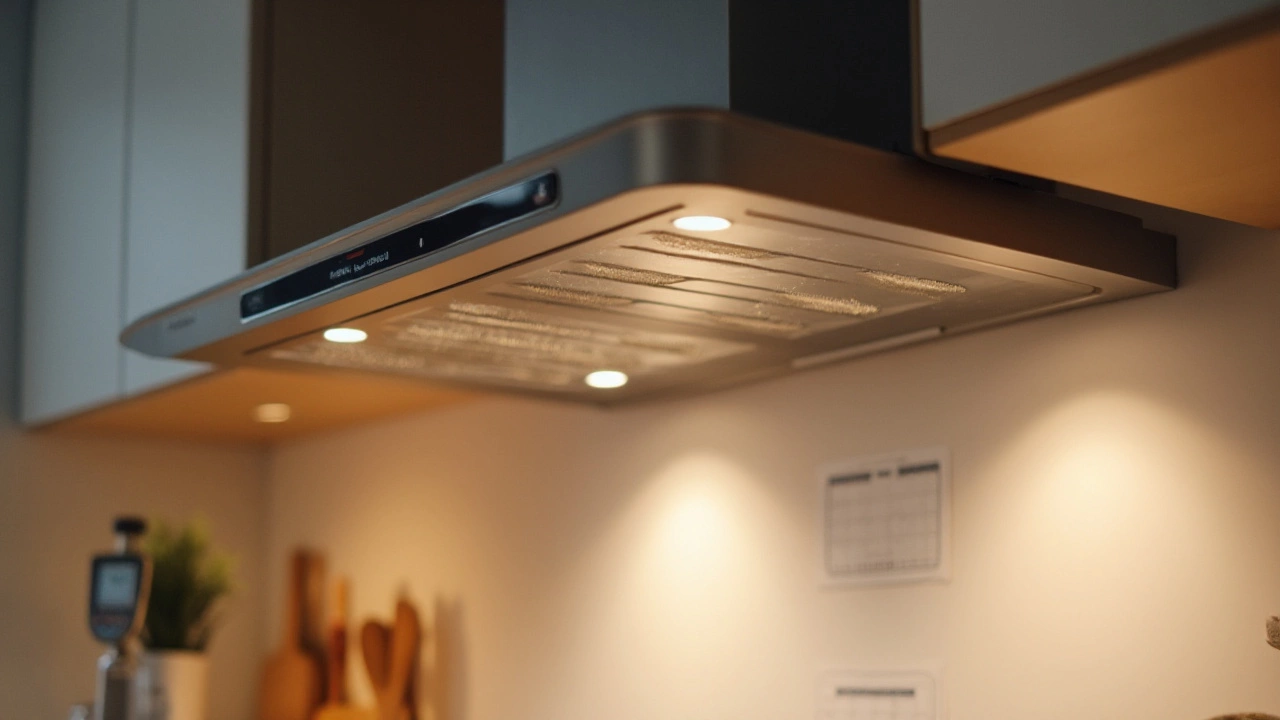Extractor fans are unsung heroes of our daily lives, tirelessly working to keep our spaces fresh and free of unwanted moisture and odors. Yet, like all hardworking appliances, they require a bit of TLC to keep operating at their best. Many people overlook the importance of regular servicing, but this practice can extend the life of your fan and help avoid unexpected breakdowns.
In this article, we delve into the reasons why you should consider scheduling a regular maintenance check for your extractor fan. Whether you're an experienced DIY enthusiast or someone who simply appreciates a well-functioning home, learning the ins and outs of extractor fan upkeep can make a world of difference. From tackling common issues head-on to keeping your ventilation system efficient, a bit of preventive maintenance can go a long way.
- Why Servicing is Necessary
- Benefits of Regular Maintenance
- Recommended Servicing Frequency
- Common Problems and Solutions
- DIY Tips for Effective Upkeep
Why Servicing is Necessary
Extractor fans are pivotal to keeping our homes comfortable and safe by managing humidity and unwanted odors. Despite their critical role, many homeowners tend to neglect the regular servicing of these systems. It's essential to recognize that, like any mechanical device, extractor fans require periodic attention to function efficiently. Dust and grease build-up over time, even in the most immaculate homes, leading to reduced efficiency. As these deposits accumulate, the fans must work harder, risking overheating and premature wear. So, by scheduling regular maintenance, not only do you ensure the longevity of your fan, but also its efficacy in controlling air quality, which can significantly affect health, particularly for those with allergies or respiratory concerns.
The National Fire Protection Association reports that dirt buildup in extractor fans is a common cause of fire in both residential and commercial settings. Regular cleaning and servicing can mitigate this risk dramatically. To illustrate, imagine a kitchen fan covered in a thick layer of grease and cooking residues; it becomes inefficient and, worse, a potential fire hazard. Often, the importance of servicing is reinforced by the stark contrast between a clogged fan and a freshly cleaned one. The latter not only performs its duties more effectively but also does so quietly, reducing noise pollution in the home—a necessary improvement, especially in compact living spaces.
Moreover, consistent servicing can also reveal potential issues before they necessitate costly repairs. A professional inspection might uncover a slowly corroding motor or worn-out blades, which, if addressed promptly, can prevent complete system replacements. Interestingly, studies indicate that routine maintenance can extend the life of an extractor fan by several years, proving it to be a cost-effective measure in the long run. For instance, a small outlay on routine checks and cleaning can save hundreds of dollars that would otherwise be spent replacing a burnt-out unit. Regular maintenance also affords the opportunity to upgrade components, such as switching to more energy-efficient parts, thus reducing electricity consumption and aiding environmentally conscious living.
"Preventive maintenance isn't just about protecting your investment; it's about peace of mind," says renowned home maintenance expert Emily Hayes. "Knowing your extractor fan is running safely and efficiently gives you one less worry in a hectic household."
In our modern energy-conscious age, the demand for improved home efficiency is greater than ever. Servicing your fan regularly can enhance energy efficiency, thus impacting electricity bills positively. A clean fan faces less air resistance, reducing strain on the motor and power usage. Even the smallest reduction in energy consumption accumulates over time, presenting noticeable savings and contributing to a greener footprint. People are progressively understanding that a well-serviced extractor fan does more than just ventilate; it plays a vital role in sustainable living. In every sense, from safety to savings, servicing your extractor fan is not just a recommendation but a necessity.
Benefits of Regular Maintenance
Regular maintenance of your extractor fan is akin to giving your car routine oil changes—it keeps it running smoothly and extends its life. First and foremost, well-maintained extractor fans are much more efficient. They operate at optimal power, using less energy, which translates to lower electricity bills. This is a significant benefit considering the cumulative energy savings over time, especially in homes where fans are used frequently.
During servicing, any hidden issues can be identified and fixed before they evolve into more serious, costly problems. A neglected fan can struggle with poor ventilation performance, leading to moisture accumulation that fosters mold growth. This not only damages home interiors but also poses health risks. Therefore, keeping fans in top condition can protect both your property and well-being.
In addition, regularly serviced extractor fans contribute to better indoor air quality. By ensuring that dust, grease, and debris are not clogging the system, the fan remains powerful in removing odors and preventing humidity build-up. This proactive approach maintains a clean and fresh atmosphere, particularly in critical areas like kitchens and bathrooms where ventilation is crucial.
Noise reduction is another underrated perk of regular maintenance. Fans that work harder due to accumulated dirt tend to rattle or make annoying noises. Routine cleaning and lubrication keep moving parts from wearing down and becoming loud. As such, maintaining the fan doesn’t only enhance efficiency, but it also ensures a quieter home environment.
Another aspect worth mentioning is safety. Extractor fans that accumulate dust and lint pose a fire hazard. Over time, these materials can build up on the fan's motor and ductwork, becoming a risk factor. Regular maintenance includes cleaning these components and possibly upgrading the fan’s parts to meet current safety standards, reducing potential hazards. According to the National Fire Protection Association, poor maintenance of appliances like fans can contribute to electrical fires in residential settings.
Anecdotal Evidence From Experts
"Regular extractor fan servicing saves money in repairs and energy costs while ensuring safety," said John Anderson, a ventilation systems expert with over 20 years of industry experience.
"Think of it as investing in peace of mind—your fan works quietly, efficiently, and safely. Ignoring maintenance needs invites trouble," he adds.
This perspective is shared by many professionals who emphasize the link between consistent upkeep and avoiding emergency fixes. Taking these preventative measures can assure homeowners that their home ventilation operates without hitches.
Overall, regular maintenance of extractor fans not only enhances their performance but also brings peace of mind. By prioritizing upkeep, homeowners are making a wise decision that balances efficiency, safety, and comfort.

Recommended Servicing Frequency
Keeping on top of your extractor fan maintenance doesn’t require a degree in engineering, but understanding the right servicing frequency is crucial to avoid any hiccups down the line. Most manufacturers suggest that an extractor fan should be checked and cleaned at least once a year. However, depending on the environment and usage, more frequent checks might be necessary to ensure it functions optimally. Kitchens and bathrooms, being high-moisture environments, tend to tax these fans more intensively. Therefore, in these areas, a six-month checkup can be beneficial, even if the fan seems to be working fine.
Now, why these timeframes? Well, it's all about preventing problems before they start. Dust, grease, and moisture can accumulate quite rapidly in the internal parts, particularly in high-use areas. This not only impacts the fan’s efficiency but might also lead to more significant issues like noise, or, worse yet, total failure. According to the Respected Institute of Home Environment, "consistency in cleaning and checking extractor fans can increase their lifespan by 30%, saving you replacement costs and energy bills in the long run." Routine maintenance aligns with this notion, as it keeps fans efficient and your indoor air quality healthy.
If you're wondering about the specific signs indicating when a service might be necessary before the scheduled maintenance, there are a few things to watch out for. Reduced airflow, unusual noises, and an increase in moisture or odors in the room can all signal that your fan might need some attention. If these symptoms appear, it could be time to advance that yearly checkup. Regularity in maintenance is key, but being responsive to issues is just as important.
To keep track, some homeowners find it helpful to maintain a simple log of their servicing intervals. You can note down each service date and any observations or changes you notice afterwards. Such records can be a handy reference not just for scheduling future services but also for spotting any recurring issues or deterioration trends over time. This methodical approach aids in the scheduling of necessary maintenance and is incredibly useful when new issues arise that might need professional assessment.
So, how does one execute this regular maintenance without missing a beat? An organized plan is your best ally. Planning based on seasons is convenient for most. If you’re in a cooler climate, checking your fans just before winter and a follow-up in spring can ensure that condensation problems are minimized during these damp periods. In warmer regions, a mid-summer check can help manage heat-induced damages. Remember, the goal is to ensure your extractor is in peak operating condition, so adaptability to environmental demands is essential.
While DIY enthusiasts might enjoy the job themselves, those less familiar with the internal workings of these devices might prefer professional assistance. Having an expert whom you trust and can hire semi-annually will ensure that the fan is thoroughly cleaned and inspected without you having to worry about missing critical maintenance steps. For those wanting to tackle this work themselves, there's plenty of online resources, including video guides, that can walk you through the process safely.
Common Problems and Solutions
Extractor fans, despite their robustness, can face a variety of issues that might impede their performance. One prevalent problem is the buildup of dust and grease, which often leads to reduced airflow. As these particles accumulate, they can clog the fan's vents and blades, diminishing its ability to ventilate effectively. This is particularly common in kitchen extractor fans, where cooking grease is a constant adversary. The solution is rather straightforward—regular cleaning. By routinely disassembling the fan and gently cleaning each component with a non-abrasive detergent, you can maintain optimal airflow and ensure the fan's longevity. It's the simple act of cleaning that often makes all the difference.
Another issue frequently encountered is the malfunctioning of the fan's motor. Over time, wear and tear can lead to the motor overheating or, in some cases, ceasing to function entirely. This is usually due to a lack of lubrication in the motor's moving parts or an electrical fault. It's important not to attempt intricate repairs unless you have the necessary knowledge. Instead, it's advisable to seek the assistance of a professional technician. They can provide an accurate diagnosis and, if necessary, replace the motor with a compatible model. Lubricating the motor's components at regular intervals can preempt many of these issues, keeping the fan in tip-top shape.
"Regular maintenance is the heart of the home appliance longevity," says Michael Ferrel, a seasoned home improvement expert, emphasizing the critical role upkeep plays in preventing appliance failure.
Another common situation is the unappealing noise emanating from the fan. Loud grinding or buzzing sounds usually indicate something is amiss. This could be due to loose components or debris trapped within the fan unit. Often, tightening screws and securing any loose parts can alleviate the noise, restoring the fan's operation to its quiet efficiency. If noise persists, checking for foreign objects or signs of excessive wear might be necessary. Clear the area around the fan and re-secure components where needed, ensuring that everything is in perfect working order.
Finally, there are times when the extractor fan simply fails to turn on. This can be linked to electrical wiring issues or a blown fuse. To address wiring issues, it's crucial to first check the power supply and ensure it's functioning correctly. For those comfortable with handling basic electrical tasks, examining the wiring connections and replacing any damaged sections may resolve the problem. However, troubleshooting electrical issues should be conducted with caution, and professional assistance is recommended if you're unsure. Always remember that safety should be the priority when dealing with electrical appliances.
Handling these common issues effectively requires a keen eye and regular attention. By understanding your extractor fan's typical pitfalls, you not only safeguard its efficiency but also ensure cleaner air and a more comfortable living environment. Regular servicing, attention to detail, and immediate resolution of any arising issues are key to maintaining your fan's performance and extending its lifespan.

DIY Tips for Effective Upkeep
Keeping your extractor fan in top-notch condition doesn't have to be a daunting task. With a few simple steps, you can maintain the efficiency of this essential appliance and extend its lifespan. First and foremost, it's important to establish a routine cleaning schedule. Regularly cleaning the fan blades and filters not only improves performance but also reduces the risk of allergens circulating in your home. Dust and grease tend to accumulate over time, especially if the fan is located in the kitchen, where cooking vapors are a constant challenge. To tackle this, remove the cover and use a soft brush or vacuum to gently clean the blades, then wash the filters with warm soapy water. Let everything dry thoroughly before reassembling.
Another crucial tip is to periodically check the electrical connections. Over time, vibrations can cause these connections to loosen, leading to inefficiencies or potential hazards. Unplug the fan before inspecting the wiring, and look for any signs of wear or corrosion. Tighten any loose screws and replace damaged wires promptly. Keeping your fan safe is as important as maintaining its function. For those who like to track statistics, consider that a well-maintained fan can improve energy efficiency by at least 15%, which is not just beneficial for the appliance but also for your wallet.
Sometimes, you might encounter a noisier-than-usual fan. This could signal that the bearings are wearing out. In such cases, applying a few drops of lubricating oil to the moving parts can often do the trick. The noise might reduce considerably, restoring the quiet operation you’re accustomed to. While you’re at it, don’t forget to ensure the fan is securely mounted. Loose fittings can cause excess vibration and noise, potentially damaging the unit or nearby structures.
"Regular maintenance not only increases the lifespan of your appliances but also ensures they work at peak efficiency," observes Jane Stevens, a renowned home efficiency expert. "By investing a little time in upkeep, homeowners can enjoy better performance and lower energy costs."Finally, one must not underestimate the value of proper ventilation. Make sure the exhaust ductwork is free from blockages as these can severely impact the fan's efficiency. A clogged duct can cause the fan to work harder than necessary, leading to premature wear and tear. Conducting a smoke test can help you identify any blockages or leaks. Simply light a stick of incense near the fan and watch how the smoke is drawn into it. If the smoke dissipates too slowly or leaks out, it's time to check the ductwork.
For those interested in numbers, here's a quick reference table shedding light on potential savings with efficient extractor fan maintenance:
| Scenario | Energy Savings |
|---|---|
| Clean Filters and Blades Regularly | 10-15% |
| Secure Electrical Connections | 5-10% |
| Vent Duct Maintenance | 10-20% |
By following these DIY tips, you'll not only keep your extractor fan running smoothly but also contribute to a healthier, more financially efficient home. Remember, a little proactive care can prevent major expensive repairs in the future, and that's a promise anyone can appreciate.
